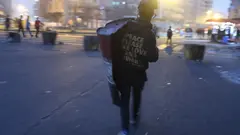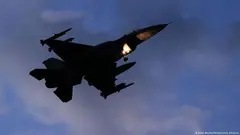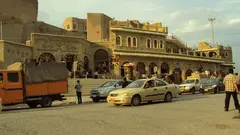Masoud Barzani
All topics-
 20 years after the U.S. invasion
20 years after the U.S. invasionIraq's wounds are slow to heal
20 years after the U.S. invasion, the country between the Euphrates and Tigris rivers is only just beginning to recover from the aftermath. But the road is paved with obstacles. Birgit Svensson reports from Iraq
-
 Turkey, Iran – and Iraq's Kurds
Turkey, Iran – and Iraq's KurdsDays of reckoning
The Kurds are under attack from two sides: from Turkey, and from Iran. The situation in their territories in northern Iraq is becoming increasingly desperate. Birgit Svensson reports from Erbil
-
 Kurdistan's decline
Kurdistan's declineIraq's beacon shines no more
The Kurds are fleeing Kurdistan. The wave of refugees on the Belarusian-Polish border and the drowned Kurds in the English Channel are only the tip of the iceberg. Birgit Svensson visited Erbil and Dohuk to find that the exodus from Kurdistan has already been going on for several years
-
 Anti-government protests
Anti-government protestsIs this Iraq's Arab Spring?
Iraq is currently facing such an alarming array of economic, political and social problems that many observers fear no-one will be up to the task of delivering the much-needed reforms. By Stasa Salacanin
-
 The uncertain future of Kurdish autonomy
The uncertain future of Kurdish autonomyWhat next for Iraqʹs Kurds?
A sense of resignation and pessimism is spreading through the Kurdistan region of Iraq, especially among the younger generation. The economic standstill, rampant youth unemployment and the omnipotence of the clans are driving people to despair. Dara Alani reports from Sulaymaniyah
-
 "Islamic State" in Iraq
"Islamic State" in IraqBeware the jihadist hydra
Kurdish peshmerga in Iraq say that IS is rising like a phoenix from the ashes. The organisation is re-grouping to fill the void left by its quarrelling adversaries. Judit Neurink reports from Irbil and Mosul
-
 Yazidis mourn their devastated community
Yazidis mourn their devastated communitySinjar is not Mosul
Where can Iraq's Yazidis live in the future? Their home, Sinjar, has been liberated, but the Islamic State genocide that began on 3 August 2014, has left an indelible mark on their city. Sandra Petersmann reports
-
 Iraqʹs wrangle over natural resources
Iraqʹs wrangle over natural resourcesThe battle for Kurdish oil
Tensions between Iraqi federal government and the Kurds centres around a long-running dispute over the countryʹs oil revenues. While Baghdad denies Kurdistanʹs right to conclude production contracts without prior central government approval, the Kurdistan Regional Government claims this as a constitutional right. By Stasa Salacanin
-
 Parliamentary elections in Iraq
Parliamentary elections in IraqShifting towards Iran?
At the forthcoming parliamentary poll in Iraq, the question is who will gain the upper hand – pro-Iranian Shias or pro-western forces? A pre-election analysis by Arnold Hottinger
-
 Fighting over Kurdish independence
Fighting over Kurdish independenceA political fiasco
By going ahead with the referendum on independence, Massoud Barzani has forfeited the support of his international allies, while bringing tensions with Iraqi central government to a dangerous head. If Barzani hoped the referendum would consolidate his own power base, he couldn′t have been more wrong. An analysis by Cigdem Akyol
-
 Recep Tayyip Erdogan
Recep Tayyip ErdoganSecuritising Turkish foreign policy: Turning back the clock
Turkey′s armed forces chief is due to visit Tehran this week, the trip is the latest by the region′s top generals in and out of Ankara. This military traffic is being seen as evidence of a foreign policy increasingly dictated by security concerns, last seen in the 1990′s. Dorian Jones reports from Istanbul
-
 Kurdistan
KurdistanThe future of a people: Good Kurd, bad Kurd
When it suits the political agenda of those in power, the Kurds are seen as good patriots. The rest of the time, they are condemned as villainous traitors. It′s a situation that is repeated in Turkey, Syria and – argues Hoshang Ossi – within the Kurdistan Workers′ Party (PKK) itself